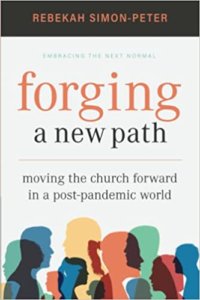Are there folks in your church who got out of the habit of attending during the pandemic and haven’t returned yet? Rebekah Simon-Peter says that one sincere, guilt-free invitation might be all that is needed to get them back.
The common wisdom is that a church only has three weeks to connect with people who are absent. After that, they’ve internalized the message that you haven’t missed them. With the pandemic, however, new rules apply. I believe that even people who left before the pandemic are one invitation away from returning. That’s because the biggest reason people come back to church is that they are invited. One sincere, guilt-free invitation can make all the difference for those who simply got out of the habit during the pandemic or those looking for a life change.
The power of personal invitation
These invitations can come in the form of a person-to-person invitation to a friend, relative, neighbor, or colleague. “Overall, 41% of the formerly churched said they would return to the local church if a friend or acquaintance invited them. Younger adults are even more influenced by the power of the invitation. Approximately 60% of those 18–35 would consider returning to church if someone they knew asked them to come back.”
People long to belong
If the biggest reason people come back to church is through an invitation, the biggest need driving people to church is because they feel an emptiness — something missing. Even though they may not be able to put it into words, they need the very things you are offering. These include the need for God, community, belonging, a connection they can access online and offline, and a sense of awe and the miraculous in their life. You can help them fill that gap.
Sometimes an important life change gets a person thinking about God, spirituality, or eternity. This life change can be a birth, death, marriage, divorce, retirement, or some other dramatic change to their normal way of living. Perhaps they moved and are ready to find a church. They may come to church to connect with important truths to have guidance for their lives. Again, you can help them fill that gap.
After living virtually, people are eager to reconnect with humanity. When visitors come, go out of your way to greet and welcome them. Remember, people long to belong. They want to know they matter and to be part of something larger than themselves.
Celebrate community
As you grow the post-pandemic church, find people, places, and things to celebrate. Celebration is good for the soul. It’s even a key component of healthy emotional intelligence. It draws communities together, builds bonds of happiness, and allows you to deepen your faith. It marks progress and gives you a chance to praise God. It reinforces the good you are doing.
Celebration is also biblical. Jesus used parables to demonstrate what we can celebrate. Celebrate when something lost is found, as in the parable of the lost sheep (Luke 15:3-7), the lost coin (Luke 15:8-10), or the parable of the prodigal son (Luke 15:11-32). In each story, when the shepherd found his sheep, when the woman found her coin, and when the father’s son returned to him, they all “rejoiced.”
The takeaway of these three stories for us is don’t take anything for granted — not one sheep, one coin, or especially one son. Rejoice over all that has been lost and now is found, like face-to-face worship and the simple joy of being together.
 This material is excerpted from Forging a New Path: Moving the Church Forward in a Post-Pandemic World (Market Square Books, 2022) by Rebekah Simon-Peter. Used by permission of Market Square Books. This book is also available at Cokesbury and Amazon.
This material is excerpted from Forging a New Path: Moving the Church Forward in a Post-Pandemic World (Market Square Books, 2022) by Rebekah Simon-Peter. Used by permission of Market Square Books. This book is also available at Cokesbury and Amazon.
Related Resources
- How Has COVID-19 Impacted Religious Participation? Amy Kubichek
- Minding the Church’s Doors by Nancy Taylor
- Three Principles of Radical Hospitality by Yvonne Gentile and Debi Nixon






